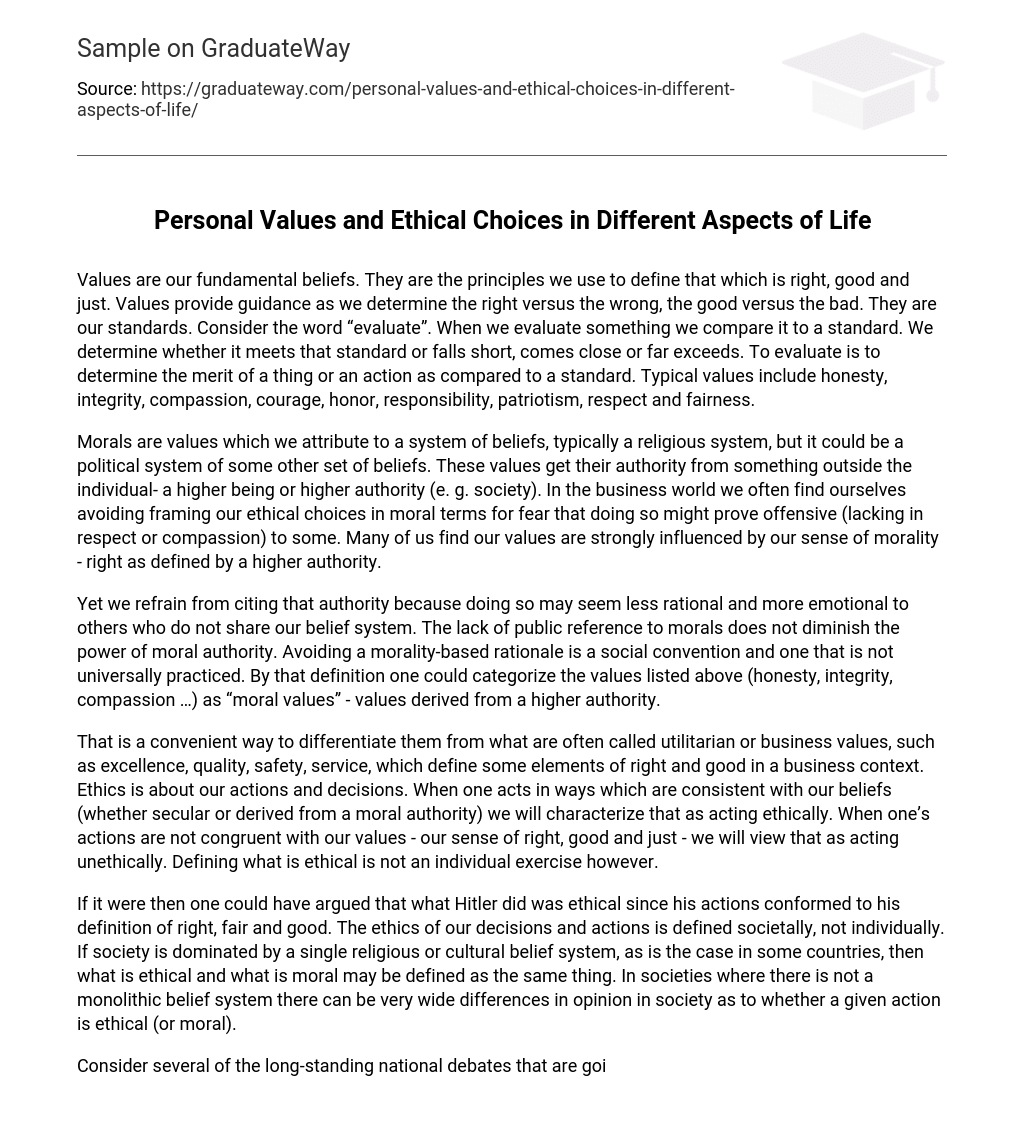Values are our fundamental beliefs. They are the principles we use to define that which is right, good and just. Values provide guidance as we determine the right versus the wrong, the good versus the bad. They are our standards. Consider the word “evaluate”. When we evaluate something we compare it to a standard. We determine whether it meets that standard or falls short, comes close or far exceeds. To evaluate is to determine the merit of a thing or an action as compared to a standard. Typical values include honesty, integrity, compassion, courage, honor, responsibility, patriotism, respect and fairness.
Morals are values which we attribute to a system of beliefs, typically a religious system, but it could be a political system of some other set of beliefs. These values get their authority from something outside the individual- a higher being or higher authority (e. g. society). In the business world we often find ourselves avoiding framing our ethical choices in moral terms for fear that doing so might prove offensive (lacking in respect or compassion) to some. Many of us find our values are strongly influenced by our sense of morality – right as defined by a higher authority.
Yet we refrain from citing that authority because doing so may seem less rational and more emotional to others who do not share our belief system. The lack of public reference to morals does not diminish the power of moral authority. Avoiding a morality-based rationale is a social convention and one that is not universally practiced. By that definition one could categorize the values listed above (honesty, integrity, compassion …) as “moral values” – values derived from a higher authority.
That is a convenient way to differentiate them from what are often called utilitarian or business values, such as excellence, quality, safety, service, which define some elements of right and good in a business context. Ethics is about our actions and decisions. When one acts in ways which are consistent with our beliefs (whether secular or derived from a moral authority) we will characterize that as acting ethically. When one’s actions are not congruent with our values – our sense of right, good and just – we will view that as acting unethically. Defining what is ethical is not an individual exercise however.
If it were then one could have argued that what Hitler did was ethical since his actions conformed to his definition of right, fair and good. The ethics of our decisions and actions is defined societally, not individually. If society is dominated by a single religious or cultural belief system, as is the case in some countries, then what is ethical and what is moral may be defined as the same thing. In societies where there is not a monolithic belief system there can be very wide differences in opinion in society as to whether a given action is ethical (or moral).
Consider several of the long-standing national debates that are going on in the United States. Often the controversy is the result of people coming to a question from different moral positions or from different values. Take the very difficult question of abortion. If your religious belief system defines abortion as taking a life then you cannot be ethical (acting in ways that are consistent with your values) and support the position that abortion is a woman’s individual choice.
If your personal value system holds that control of one’s body is an inviolable personal right then the idea that others – individually or collectively – can impose their will on you is antithetical to that right. Culturally we also see differences as to how values are defined. In US society we stand against nepotism. We believe that a concern for fairness to all employees demands that large businesses protect their employees from the unfairness inherent in the situation where an individual supervisors a member of his or her immediate family.
The concern is for the inevitability of preferential treatment and/or the inappropriate sharing of personal/confidential information about others in the workplace. Fairness demands that nepotism not be tolerated. In the Arab world, nepotism is often viewed as an illogical concern. The cultural obligation to look after one’s family outweighs other concerns. Of course one would favor family. That is what family does. That is the right thing to do. While I am not arguing that ethics is “situational” I am arguing that while we may agree on values, we may disagree as to which values apply or which actions best satisfy those values.
Is it fair to treat each employee identically (equality) or is it fair to treat each employee according to his or her needs (equity)? In our society we argue both. And of course we have ethical dilemmas, where the choice is not between what we believe to be right and what we believe to be wrong, but between competing rights. The classic case: “Is it ethical to steal a loaf of bread to feed a starving child. ” The answer, “It depends. ” Bu t that is another article.





